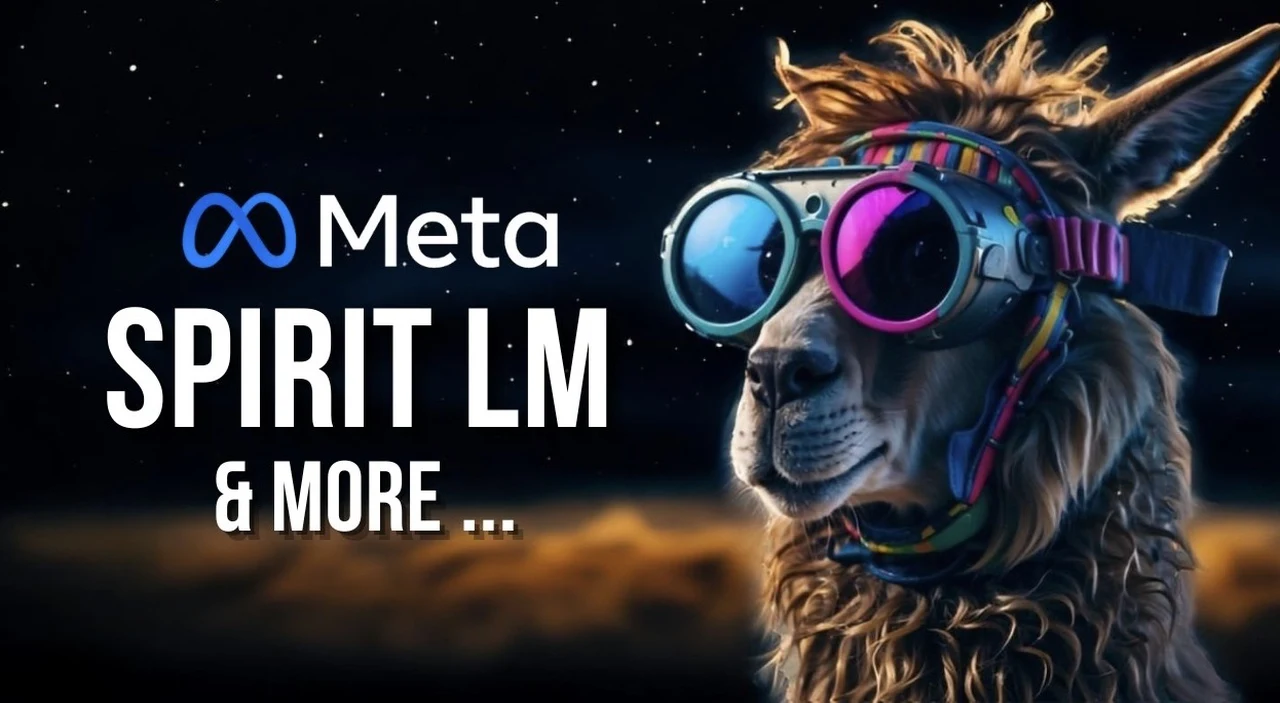Meta has unveiled a suite of innovative AI models and datasets, signaling a significant leap forward in machine intelligence. Developed by Meta’s AI Research (FAIR) team, these innovations are set to transform various fields, from speech processing to material science. By open-sourcing many of these models, Meta is fostering a collaborative ecosystem that enables researchers and developers worldwide to push the boundaries of AI technology.
At the heart of this initiative is a commitment to open-source collaboration, a move that provides widespread access to access to innovative technology and enables a diverse community to tackle some of the world’s most pressing challenges. Whether it’s enhancing video editing capabilities with SAM 2.1 or transforming language processing with Metal Lingua, these models are designed to inspire and enable.
New Meta AI Models
TL;DR Key Takeaways :
- Meta has introduced a suite of advanced AI models and datasets developed by its AI Research (FAIR) team, aiming to advance machine intelligence in various fields such as speech processing and material science.
- The Segment Anything Model 2.1 (SAM 2.1) is an enhanced tool for object tracking in videos, improving segmentation capabilities and precision. It can be integrated into diverse applications like video editing and autonomous vehicles.
- Meta Spirit LM is a model that integrates speech-to-speech and text processing, preserving the expressiveness of speech while converting it into text. It has potential applications in real-time translation and virtual assistants.
- The Layer Skip Technique is a novel approach to enhancing large language model performance by selectively using layers for response generation and verification, accelerating processing times. This is crucial for applications requiring rapid responses.
- The Salsa Project addresses vulnerabilities in post-quantum cryptography, focusing on strengthening systems against AI-based attacks and ensuring robust protection for sensitive data.
SAM 2.1: Redefining Object Tracking in Videos
The Segment Anything Model 2.1 (SAM 2.1) represents a substantial upgrade in object tracking capabilities for video content. This advanced model enhances segmentation precision, allowing for more accurate and reliable object tracking across frames. By making SAM 2.1 open-source, Meta enables developers to integrate this powerful technology into a wide array of applications.
Key applications of SAM 2.1 include:
- Advanced video editing and post-production
- Improved object detection for autonomous vehicles
- Enhanced surveillance and security systems
- More precise motion capture for animation and VFX
Meta Spirit LM: Bridging the Gap Between Speech and Text
Meta Spirit LM stands out as a new model that seamlessly integrates speech-to-speech and text processing. This innovative approach preserves the nuances and expressiveness of speech while converting it into text, opening up new possibilities for communication technologies.
While currently under a non-commercial research license, Meta Spirit LM has vast potential for:
- Real-time translation services with preserved intonation
- More natural-sounding virtual assistants
- Improved accessibility tools for the hearing impaired
- Enhanced voice-controlled interfaces
Stay informed about the latest in Meta AI Models by exploring our other resources and articles.
Layer Skip Technique: Optimizing Large Language Models
The Layer Skip Technique introduces a novel approach to enhancing the performance of large language models. By selectively using layers for response generation and verification, this technique significantly accelerates processing times without compromising accuracy.
Benefits of the Layer Skip Technique:
- Faster response times for chatbots and AI assistants
- Improved efficiency in real-time data analysis
- Reduced computational resources for AI model deployment
- Enhanced scalability for large-scale language processing tasks
Salsa Project: Fortifying AI Security
The Salsa Project addresses critical vulnerabilities in post-quantum cryptography, focusing on strengthening systems against increasingly sophisticated AI-based attacks. As the landscape of digital threats evolves, the Salsa Project’s contributions are essential for maintaining robust protection of sensitive data and critical infrastructure.
Key focus areas of the Salsa Project include:
- Developing quantum-resistant encryption algorithms
- Enhancing secure communication protocols
- Improving authentication mechanisms against AI-powered attacks
- Creating tools for early detection of AI-based security threats
Metal Lingua: Transforming Language Model Training
Metal Lingua offers a framework for training large language models with unprecedented efficiency. By significantly reducing computational demands, this framework enables organizations to achieve substantial performance gains without the need for extensive hardware resources.
Advantages of Metal Lingua:
- Reduced training time for large language models
- Lower energy consumption in AI model development
- Increased accessibility of advanced AI for smaller organizations
- Faster iteration and experimentation in NLP research
Met Open Materials 2024: Accelerating Materials Discovery
Met Open Materials 2024 provides a comprehensive suite of open-source models and datasets for inorganic materials discovery. This initiative accelerates research in material science, potentially leading to breakthroughs in various technological fields.
Potential impacts of Met Open Materials 2024:
- Faster development of advanced electronics materials
- Discovery of new compounds for renewable energy technologies
- Improved materials for aerospace and automotive industries
- Enhanced drug delivery systems in pharmaceuticals
Maxima: Elevating Crosslingual Translation
Maxima is an advanced crosslingual sentence encoder that significantly enhances translation accuracy. By employing sophisticated token-level objectives, it offers improved multilingual representation, making it an invaluable tool for global communication and content localization.
Applications of Maxima include:
- More accurate machine translation services
- Improved multilingual content management systems
- Enhanced cross-cultural communication tools
- Better language learning applications
Self-Thought Evaluator: Transforming Synthetic Data Generation
The Self-Thought Evaluator is a new model for generating high-quality synthetic preference data used in training reward models. This innovative approach delivers faster processing times and outperforms larger models in evaluation tasks, making it a valuable asset in AI research and development.
Key benefits of the Self-Thought Evaluator:
- Accelerated development of AI models requiring preference data
- Improved quality and diversity of training datasets
- Reduced reliance on human-annotated data
- Enhanced efficiency in AI model evaluation processes
Meta’s Vision for Open-Source AI Innovation
Meta’s decision to open-source these models, or at least provide open weights, underscores its commitment to advancing AI research on a global scale. By facilitating non-commercial research and local experimentation, Meta enables the AI community to explore new frontiers in machine intelligence collectively. This collaborative approach is crucial for:
- Accelerating the pace of AI innovation
- Providing widespread access to access to innovative AI technologies
- Fostering a diverse ecosystem of AI applications
- Addressing complex global challenges through collective effort
As these new Meta AI models and techniques are adopted and refined by the global research community, we can expect to see rapid advancements across various sectors, from healthcare and education to environmental conservation and beyond. Meta’s contributions represent not just technological progress, but a step towards a more collaborative and innovative future in AI research and development.
Media Credit: Prompt Engineering
Filed Under: AI, Top News
Latest togetherbe
Disclosure: Some of our articles include affiliate links. If you buy something through one of these links, Geeky Gadgets may earn an affiliate commission. Learn about our Disclosure Policy.




